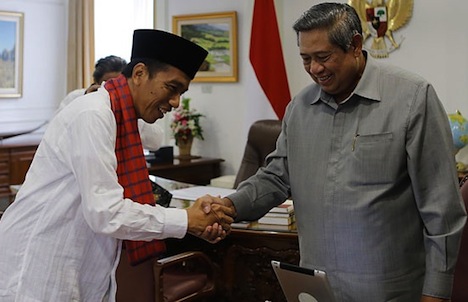11. Indonesia presidential election, July 9.![]()
Indonesia will directly elect its president for just the third time in 2014, and it’s the first direct election for which outgoing, term-limited president Susilo Bambang Yudhoyono (known popularly as ‘SBY’) won’t be on the ballot.
His most likely successor is the young, popular governor of Jakarta state, Joko Widodo, who came to office in 2012 after defeating the incumbent, Fauzi Bowo, who belongs to Yudhoyono’s own Partai Demokrat (Democratic Party).
Widodo (pictured above, left, with SBY), who served as the mayor of Surakarta in Java between 2005 and 2012, has become an overnight political sensation in Indonesia — drawing comparisons to another world leader who spent his youth in Indonesia. He belongs to the Partai Demokrasi Indonesia Perjuangan (PDI-P, Indonesian Democratic Party — Struggle) that was founded by former president Megawati Sukarnoputri, who is herself the daughter of Indonesia’s first post-independence president Sukarno. Though Megawati has expressed some interest in running for president in 2014, she trailed SBY by a comically wide margin in the previous two elections — she lost 60.8% to 26.8% in the most recent July 2009 election, and she lost by a margin of 60.6% to 39.4% in the September 2004 runoff.
Widodo, like Yudhoyono a decade ago, has a pristine, anti-corruption reputation. In his year as governor, he’s attempted to boost Jakarta’s minimum wage, begin construction on the long-delayed Jakarta subway line, visited some of Jakarta’s poorest neighborhoods, and instituted a universal health care program, though critics argue it’s a populist scheme and that its implementation was flawed.
SBY will leave office in 2014 with a mixed reputation — he brought economic and political stability to Indonesia, which has achieved an average GDP growth of 5.8% in the nine years between 2004 and 2012, and it’s expected to fall just shy of 6% growth in 2013. His government finalized a peace agreement with the breakaway province of Aceh, and SBY has managed to keep the lid on most separatist tensions within the sprawling Indonesian archipelago. But Yudhoyono has also failed to root out Indonesia’s widespread and endemic corruption. Despite helping Indonesia recover from the devastating 2004 earthquake and tsunami, the country continues to lack adequate infrastructure.
Aburizal Bakrie, a businessman who served as coordinating minister for economy from 2004 to 2005 and as coordinating minister for people’s welfare from 2005 to 2009, is likely to become the presidential candidate of Partai Golongan Karya (Party of the Functional Groups, known as ‘Golkar’), Indonesia’s ruling party from 1966 to 1999 during much of Suharto’s authoritarian reign. Wiranto, a former Golkar member and retired general with a record of human rights abuses in East Timor (during its struggle for independence in the 1990s), may once again run for the presidency. Prabowo Subianto, a former general and Megawati’s 2009 vice-presidential running mate, may also run as the candidate of a minor center-left party, the Great Indonesia Movement Party.
One early test of support will be Indonesia’s April 9 parliamentary elections, which will determine the members of both houses of the People’s Consultative Assembly — the 560-seat Dewan Perwakilan Rakyat (People’s Representative Council) and the more limited 132-member Dewan Perwakilan Daerah (Regional Representative Council). Though the Democrats are currently the largest party in the Indonesian assembly, they govern in coalition with Golkar and several other parties. But polls show that the Democrats could not only fall behind the PDI-P, which leads parliamentary opinion polls and could emerge from opposition for the first time in a decade, but also Golkar.
Photo credit to ANTARA/ABROR.
